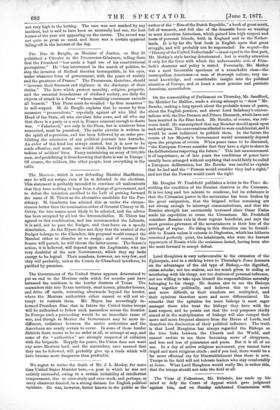Lord Houghton is very unfavourable to the extension of the
Episcopate, and in a striking letter to Thursday's Times descants on the advantages of the old type of Bishop,—the dignified, otiose scholar, not too zealous, not too much given to aiding or interfering with his clergy, not too desirous of personal influence, not too willing to take upon himself the responsibilities naturally belonging to his clergy. He desires also to see the Bishops hang together politically, and believes this to be more and more difficult, as their numbers are multiplied, and their opinions therefore more and more differentiated. He remarks that the agitation for more bishops is most eager amongst those who treat the bishops they have with the least respect, and he points out that the very purposes chiefly aimed at in the multiplication of bishops will also compel their more and more frequent absence from the House of Lords, and therefore the diminution of their political influence. The truth is that Lord Houghton has always regarded the Bishops as the true links between the Church and the World, and cannot endure to see them becoming more of clergymen, and leas and less of potentates and peers. But it is all of no use. In a day of active religious movement, you cannot have frigid and inert religious chiefs ; and if you bad, there would be a far more effectual cry for Disestablishment than there is now. Troops in the field will not tolerate leaders who stay comfortably at home. What Lord Houghton would really like is rather this, that the troops should not take the field at all.


































 Previous page
Previous page